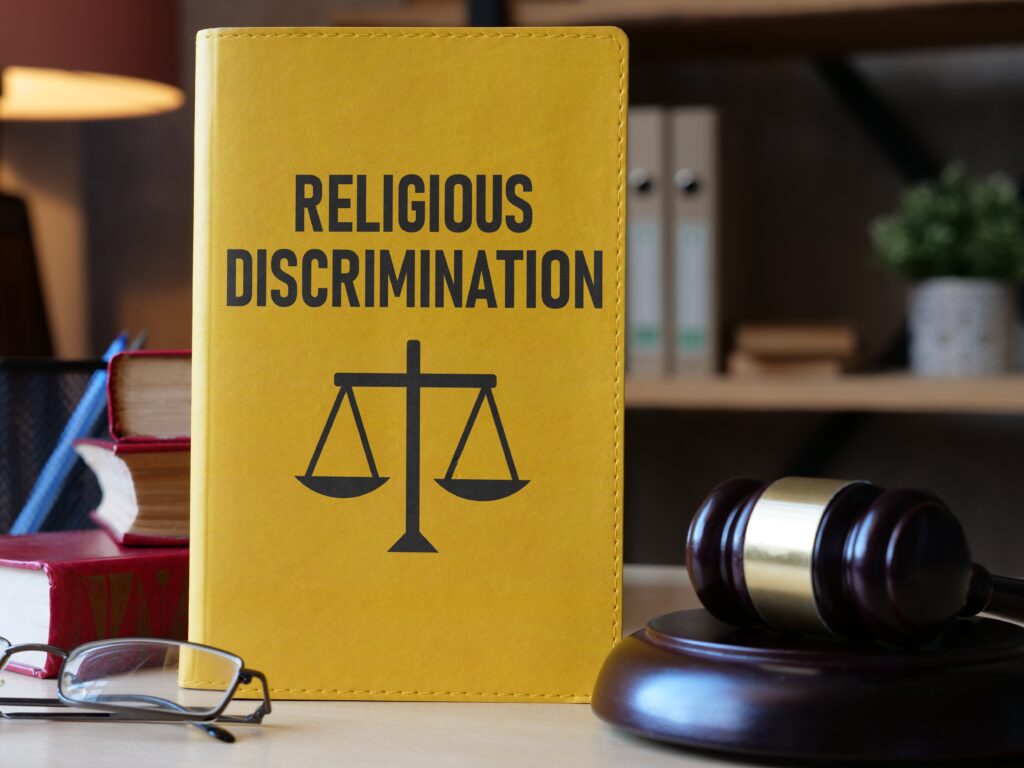The workplace blends professional and personal identities, and employees should respect and understand each other. An aspect that frequently comes into play is practicing and expressing one’s religion.
Unfortunately, instances may arise where you feel your workplace disrespects your religious beliefs at work. In such a situation, you may wonder about your rights and whether you can take legal action against your employer for religious discrimination.
Keep reading to learn about how to sue an employer for religious discrimination with help from an employment discrimination attorney in San Diego.
Schedule a Free Case Evaluation Today!
What Constitutes Religious Discrimination?
Religious discrimination occurs when an employee experiences unfavorable treatment due to their religious beliefs. This definition covers many scenarios, from direct actions against an employee to more subtle forms of discrimination.

The primary legal foundation against such discrimination is in the United States Title VII of the Civil Rights Act of 1964. This federal law prohibits employers from discriminating against employees or job applicants based on religion. This includes traditional, organized religions such as Christianity, Islam, Judaism, Buddhism, and Hinduism and other beliefs, practices, or observances. Even if they are not part of a formal church or sect, sincerely genuine religious beliefs fall under the protection of the legal foundation.
Recognizing Signs of Religious Discrimination
Recognizing signs of religious discrimination can be challenging, as it can manifest in various forms.
Here are some indicators:
- Refusal to Accommodate Religious Practices: Employers must accommodate an employee’s religious practices unless doing so would result in undue hardship for the business. Failure to accommodate reasonable requests, such as time off for religious holidays or allowing prayer breaks, can be a form of discrimination.
- Differential Treatment: Not receiving promotions might be part of this experience, being excluded from meetings or training sessions, or receiving less favorable job assignments because of religious beliefs.
- Harassment Based on Religion: Harassment can include offensive remarks about a person’s religious beliefs or practices. While simple teasing or isolated incidents may not qualify, harassment is illegal when it creates a hostile or offensive work environment or results in an adverse employment decision (such as the victim being fired or demoted).
- Enforcing Dress Codes or Grooming Policies That Conflict with Religious Practices: Enforcing policies that prohibit certain types of religious dress or grooming practices can be discriminatory unless shown to be necessary for the job.
How It Affects Employment
Religious discrimination can affect every aspect of employment, including:
- Hiring and Firing: Making decisions about hiring or firing based on an individual’s religion or religious practices clearly violates their rights.
- Job Assignments and Promotions: Assigning jobs or making promotion decisions based on an employee’s religion rather than their qualifications or performance is discriminatory.
- Compensation and Other Terms or Conditions of Employment: This includes providing different salaries, benefits, leave, or other employment terms based on religion.
Addressing Religious Discrimination
Understanding what constitutes religious discrimination is important for both employees and employers. Employees should know their rights and recognize the signs of discrimination, while employers must create an inclusive environment that respects individual religious practices and beliefs. This includes developing clear policies, providing training on religious accommodation, and promptly addressing any complaints of discrimination.

For those who believe they are experiencing religious discrimination, always document incidents, seek support from human resources or management, and consider legal advice from an employment discrimination lawyer if necessary.
Remember, every employee has the right to a workplace free from discrimination, where they can work respectfully alongside colleagues, regardless of their religious beliefs.
Legal Protections Against Religious Discrimination
In the United States, employees are safeguarded against religious discrimination in the workplace by a framework of federal laws. These laws ensure that individuals can work in environments where they are judged based on their abilities and performance rather than their religious beliefs or practices.
Title VII of the Civil Rights Act of 1964
The cornerstone of legal protections against religious discrimination is Title VII of the Civil Rights Act of 1964. This federal law prohibits employers from discriminating against employees or job applicants based on religion. This includes all aspects of employment, such as hiring, firing, promotions, job assignments, and other terms and conditions of employment.
Key provisions of Title VII include:
- Non-Discrimination: Employers cannot treat employees or applicants less favorably because of their religious beliefs. This applies across the board, from recruitment and hiring to promotions, transfers, work assignments, and compensation.
- Religious Accommodation: Employers must reasonably accommodate an employee’s religious practices unless doing so would impose an undue hardship on the employer’s business operations. Accommodations might include flexible scheduling, allowing time off for religious observances, permitting religious attire or grooming practices, and accommodating prayer or other religious practices at work.
- Prevention of Harassment: Title VII also protects employees from harassment based on religion, including offensive remarks about a person’s religion or religious practices. Harassment is illegal when it is so frequent or severe that it creates a hostile or offensive work environment or results in an adverse employment decision.
Religious Freedom Restoration Act (RFRA)
While not directly impacting the employer-employee relationship in the private sector, the Religious Freedom Restoration Act (RFRA) is another piece of legislation that underscores the importance of religious freedom in the United States.
It provides that the government must not substantially burden a person’s exercise of religion unless it is the least restrictive means to further a compelling governmental interest. Legal arguments about employment and religious practices in certain contexts have cited this law.
State Laws

In addition to federal protections, many states have their own laws that offer protection against religious discrimination in the workplace. These laws can complement federal protections and, in some cases, provide broader employee protection.
For instance, some state laws may have stricter requirements for accommodating religious practices or prohibit discrimination in smaller businesses not covered by federal laws.
What Employers Must Do
Employers have a legal obligation to comply with these laws by:
- Ensuring that their employment practices do not discriminate against employees based on religion.
- Providing reasonable accommodations for religious practices unless it causes undue hardship.
- Maintaining a workplace free from harassment based on religion or religious practices.
- Understanding and respecting the legal rights of employees regarding religious expression and practice.
When Can You Take Legal Action for Religious Discrimination?
The path from experiencing discrimination to filing a lawsuit involves several important steps, primarily guided by the Equal Employment Opportunity Commission (EEOC) in the United States.
Here’s a deeper look into the process and what you can expect.
Filing a Complaint with the EEOC
The EEOC is the federal agency charged with enforcing laws that make it illegal to discriminate against a job applicant or an employee because of the person’s race, color, religion, sex (including pregnancy, gender identity, and sexual orientation), national origin, age (40 or older), disability, or genetic information.
If you believe your religious beliefs have been a basis for discrimination, taking the first formal step involves filing a complaint with the EEOC, known as a charge of discrimination.
- Contact the EEOC: You can file a charge personally at an EEOC office, by mail, or online. Be sure to initiate contact through their website or by calling their toll-free number at 1-800-669-4000 to get guidance on the process.
- Provide Details: You must provide specific details about the discrimination, including who was involved, what happened when it happened, and why you believe you faced discrimination due to your religion.
- EEOC Assessment: The EEOC will review your charge and decide how to proceed. This can involve mediation between you and your employer, an investigation, or dismissal of the charge if the EEOC determines there isn’t enough evidence to support a discrimination claim.
The Investigation Process

If the EEOC proceeds with an investigation, they will collect evidence from you and your employer. This may include documents, emails, or witness statements about the alleged discrimination. The duration of the investigation can vary, depending on the complexity of the case and the volume of information that needs reviewing.
Resolution and Right to Sue Letter
After the investigation, several outcomes are possible:
- Settlement or Mediation: The EEOC may try to settle the charge by mediating between you and your employer to reach a voluntary agreement.
- No Evidence Found: If the EEOC does not find evidence of discrimination, they will issue a notice of dismissal and rights, allowing you to file a lawsuit in federal court within 90 days.
- Evidence of Discrimination: If the EEOC finds evidence of discrimination, they will try to settle with your employer. If a settlement is not possible, the EEOC may file a lawsuit on your behalf, although this is relatively rare. More commonly, you will receive a “right to sue” letter.
What is a Right to Sue Letter?
A “right to sue” letter from the EEOC gives you formal permission to file a lawsuit against your employer in federal court. After completing its investigation, the EEOC actively crafted and delivered this letter. Receiving this letter does not guarantee that you will win your case, but it is a necessary step in the process if you wish to pursue legal action beyond the EEOC’s investigation.
Filing a Lawsuit
Once you receive a right-to-sue letter, you have 90 days to file a lawsuit in federal court. Remember to consult with an employment discrimination lawyer to discuss your case and determine the best way to proceed. An employment discrimination attorney can guide you to move your case through the legal system, represent you in court, and work to secure the best possible outcome for your case.
Examples of Religious Discrimination Cases
- Failure to Accommodate: An employee requested Sundays off to attend church services, but the employer refused, claiming it will disrupt business operations without investigating further or attempting to find a reasonable accommodation.
- Harassment Over Religious Practices: An employee wears a hijab as part of her Muslim faith, and her coworkers make derogatory comments about her religion. Despite complaining to management, they have not addressed the harassment.
Key Considerations Before Suing for Religious Discrimination
When considering legal action for religious discrimination, there are several aspects you should carefully evaluate. These considerations will strengthen your case and ensure you proceed consistently with legal protocols and deadlines.
Here’s a breakdown of the essential factors to keep in mind.
Gathering Evidence

One of the foundational steps in preparing for a potential lawsuit is the collection of evidence. This evidence demonstrates the discrimination you faced and establishes a strong case.
Here’s what to focus on:
- Documentation: Keep a detailed record of all incidents of discrimination, including dates, times, locations, and the individuals involved. This can help establish a pattern of behavior that supports your claim.
- Communications: Save any emails, messages, or written communications related to discrimination. This can include emails denying religious accommodations or any correspondence that includes derogatory remarks about your religion.
- Witness Statements: Identify colleagues or others who witnessed the discriminatory behavior. Their accounts can provide valuable third-party perspectives on the incidents in question.
Understanding Timing and Deadlines
The legal system operates within strict time frames, known as statutes of limitations, which dictate how long you must take legal action.
For religious discrimination cases:
- EEOC Filing Deadline: Generally, you have 180 days from the date of the discriminatory act to file a charge with the EEOC. This period can extend to 300 days if a state or local law prohibits the same type of discrimination.
- Right to Sue Letter: Once you receive a right to sue letter from the EEOC, you have 90 days to file a lawsuit in federal court.
Awareness of these deadlines is crucial to ensuring that your case is heard and not dismissed on a technical basis.

Contact an Employment Discrimination Lawyer
If you decide to pursue legal action, it’s not just about seeking justice for yourself. It’s also about advocating for a respectful and inclusive workplace environment for everyone. It’s about ensuring employers understand the importance of accommodating religious practices and beliefs.
Every situation is unique, so consult an employment discrimination attorney to discuss your circumstances and explore the best course of action tailored to your needs.